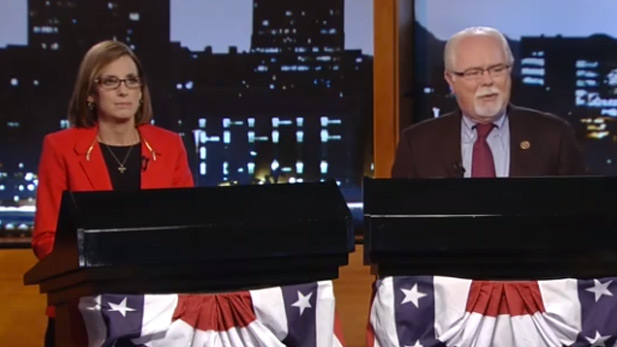 Republican Martha McSally, Democrat Ron Barber at AZPM debate Oct. 7, 2014.
Republican Martha McSally, Democrat Ron Barber at AZPM debate Oct. 7, 2014.The results in the 2nd Congressional District race tightened Monday after a judge rejected Republican Martha McSally's request to stop the counting of some provisional ballots.
Judge James Marner denied the request Monday after hearing from lawyers for both candidates and Secretary of State Ken Bennett.
McSally and Democratic incumbent Ron Barber were locked in a tight race with about 4,000 votes left to be counted. McSally was ahead by 179 votes, or 0.08 percent, in the last posted tally Monday night.
Pima County elections workers Monday counted 4,000 ballots and planned to work on the Veterans Day holiday Tuesday to try finishing, officials said.
Cochise County's votes have been counted.
McSally's legal challenge began Sunday when her lawyer, Eric Spencer, sent an email to Pima County Recorder F. Ann Rodriguez and Elections Director Brad Nelson requesting that they stop verifying provisional ballots that are missing an election worker's signature on the ballot form and that those ballots not be counted.
The county declined, and McSally's campaign went to court Monday morning.
At the hearing, Secretary of State Ken Bennett, Arizona's chief elections officer, testified by telephone that a missing election worker signature is not a fatal flaw that should keep an otherwise valid ballot from being counted, The Associated Press reported.
Barber's campaign was quick to criticize McSally's move, calling it one of her "tricks" to disenfranchise voters. A Barber spokeswoman said in an email Sunday to the news media that it was a reminder of McSally's 2012 unsuccessful move to challenge ballots in Cochise County.
Barber won the 2012 election over McSally by 2,454 votes, or 0.84 percent, in a race that took 11 days to settle.
TucsonSentinel.com reported Sunday that the new challenge affects an undetermined number of provisional ballots cast in five CD2 precincts that voted for President Barack Obama in 2012.
Both sides have made calls for campaign contributions to help cover costs of a recount, with Barber's going out Thursday and the Republican National Campaign Committee sending one on McSally's behalf Friday.
A recount would be paid for with public money, although the campaigns would have expenses for lawyers and others involved in observing the process.
A congressional race in Arizona is subject to recount if the margin is fewer than 200 votes, and it would begin after the secretary of state's election canvass is completed. The canvass and election certification is scheduled for Dec. 1.



By submitting your comments, you hereby give AZPM the right to post your comments and potentially use them in any other form of media operated by this institution.